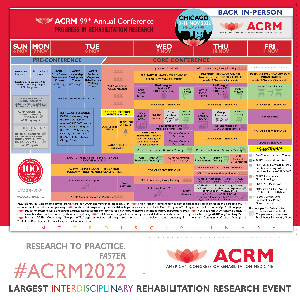Back
Lifestyle Medicine
The Cognitive Effects of Virtual Health Coaching Intervention in Six Older Adults with Cognitive Complaints
Friday, November 11, 2022
10:09 AM – 10:14 AM
Location: Station 9
- RG
Ryan M. Glatt, MS, CPT, NBC-HWC
Research Associate
Pacific Neuroscience Institute
Los Angeles, California, United States
Presenting Author(s)
Research Objectives: To investigate the feasibility, efficacy, & cognitive effects of a virtually-administered multimodal lifestyle coaching intervention with psychoeducational resources.
Design: The design of this study was a case study of six patients with a six-month follow-up, with no control group.
Setting: The study was conducted in an outpatient clinical setting via telemedicine with online supplemental psychoeducational resources.
Participants: The participants were six older adults with cognitive complaints that voluntarily opted into weekly health coaching for six months.
Interventions: The six-month multimodal health coaching intervention was administered virtually on a weekly basis, and supplemental psychoeducational was provided online for three months.
Main Outcome Measures: A twelve task computerized cognitive assessment (Cambridge Brain Sciences) measuring various cognitive domains. The participants also qualitatively recounted the behaviors and habits they successfully adhered to as the result of the intervention.
Results: The participants had an average, statistically significant, and subjectively noticeable improvement in the domains of spatial planning and visuospatial processing (p <.05), and global cognition (p <.1), the latter of which is an average across all the measured cognitive domains. There was a borderline improvement in verbal reasoning (p <.1). Participants also subjectively reported qualitative adherence to multiple lifestyle behaviors and habit development in the areas of sleep, nutrition, exercise, and high levels of satisfaction with the virtual group coaching format and the online psychoeducation resources.
Conclusions: Our results demonstrate that the virtually-administered, six-month, weekly health coaching group that addresses multiple lifestyle factors associated with brain health, supplemented by self-paced online health education, is feasible and potentially efficacious for improving several domains of cognition in six participants with cognitive complaints in an outpatient clinical setting. This format may be scalable, cost-effective, and desirable medium for facilitating effective behavior change related to the prevention of cognitive decline in clinical settings. Future studies should incorporate more extensive measures of brain health (neuroimaging and neuropsychological testing), questionnaires associated with lifestyle, cognitive activity, quality-of-life, standard-of-care controls, and larger sample sizes to further determine the efficacy of such interventions.
Author(s) Disclosures: There are no conflicts of interest to disclose.
Design: The design of this study was a case study of six patients with a six-month follow-up, with no control group.
Setting: The study was conducted in an outpatient clinical setting via telemedicine with online supplemental psychoeducational resources.
Participants: The participants were six older adults with cognitive complaints that voluntarily opted into weekly health coaching for six months.
Interventions: The six-month multimodal health coaching intervention was administered virtually on a weekly basis, and supplemental psychoeducational was provided online for three months.
Main Outcome Measures: A twelve task computerized cognitive assessment (Cambridge Brain Sciences) measuring various cognitive domains. The participants also qualitatively recounted the behaviors and habits they successfully adhered to as the result of the intervention.
Results: The participants had an average, statistically significant, and subjectively noticeable improvement in the domains of spatial planning and visuospatial processing (p <.05), and global cognition (p <.1), the latter of which is an average across all the measured cognitive domains. There was a borderline improvement in verbal reasoning (p <.1). Participants also subjectively reported qualitative adherence to multiple lifestyle behaviors and habit development in the areas of sleep, nutrition, exercise, and high levels of satisfaction with the virtual group coaching format and the online psychoeducation resources.
Conclusions: Our results demonstrate that the virtually-administered, six-month, weekly health coaching group that addresses multiple lifestyle factors associated with brain health, supplemented by self-paced online health education, is feasible and potentially efficacious for improving several domains of cognition in six participants with cognitive complaints in an outpatient clinical setting. This format may be scalable, cost-effective, and desirable medium for facilitating effective behavior change related to the prevention of cognitive decline in clinical settings. Future studies should incorporate more extensive measures of brain health (neuroimaging and neuropsychological testing), questionnaires associated with lifestyle, cognitive activity, quality-of-life, standard-of-care controls, and larger sample sizes to further determine the efficacy of such interventions.
Author(s) Disclosures: There are no conflicts of interest to disclose.
Learning Objectives:
- Upon completion, participant will be able to identify a multimodal lifestyle intervention.
- Upon completion, participant will be able to understand the methodology of a multimodal health coaching intervention.
- Upon completion, participant will be able to understand the results of a multimodal health coaching intervention.

.jpg)
